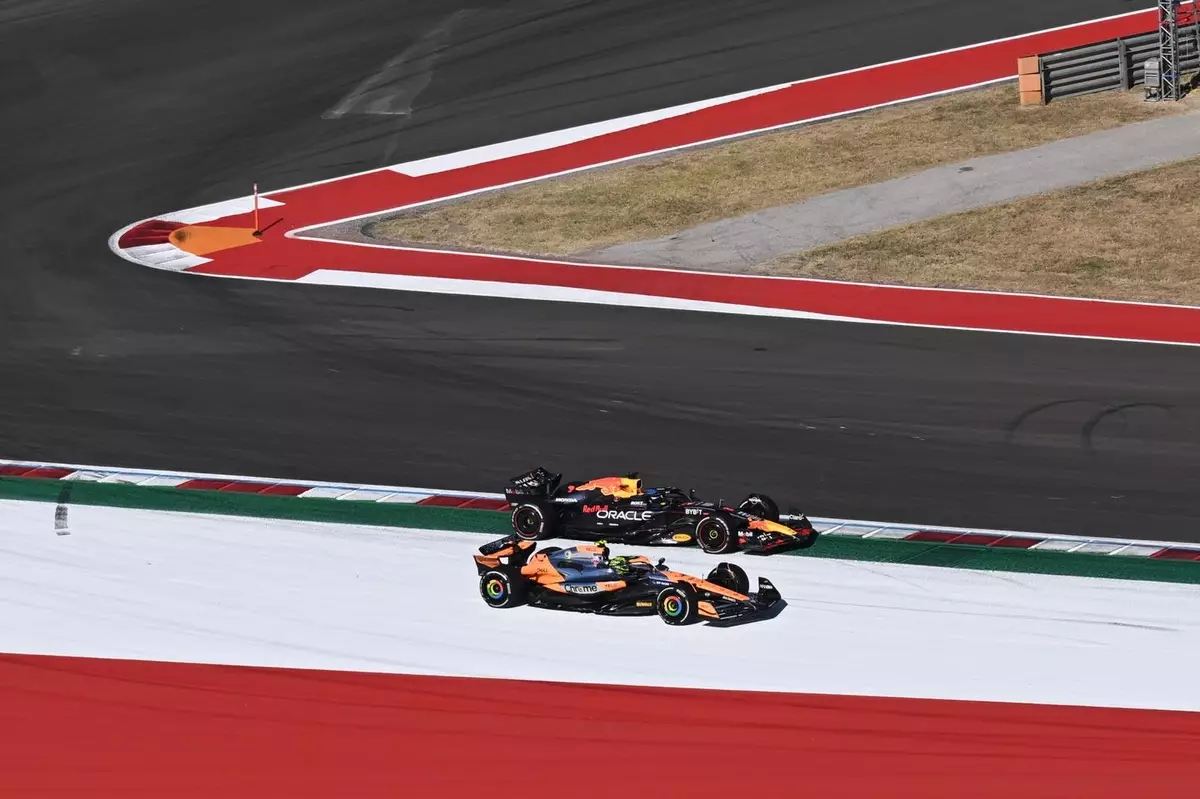The world of Formula 1 is as much about strategy and skill on the track as it is about navigating the complex labyrinth of rules and regulations off it. McLaren’s recent move to request a right of review concerning Lando Norris’s penalty at the United States Grand Prix has reignited discussions surrounding race administration, driver conduct, and the evolving standards of evidence in motorsport. This incident not only highlights the intricacies of race officiating but also raises questions about the fairness and clarity of decision-making in high-stakes environments.
During the United States Grand Prix, Lando Norris found himself at the heart of a contentious moment with reigning champion Max Verstappen. Both drivers were embroiled in a late-race battle that culminated in Norris overtaking Verstappen off the track, leading to a five-second penalty that significantly impacted his final position. The gravity of such penalties cannot be understated, especially when they can alter the competitive landscape among title contenders—an issue now at the forefront of McLaren’s push for review.
The stewards’ decision, which deemed Norris’s maneuver as warranting punishment, left many in the paddock questioning the consistency of penalties across races. McLaren’s penalty appeal suggests that the team believes they possess new, relevant evidence that could potentially overturn the ruling. This request ties directly to the FIA’s International Sporting Code, Article 14.1.1, which stipulates that a significant new element must be presented for a review to be considered.
The mechanics behind a right of review are laden with technicalities and stipulations designed to uphold the integrity of competitive fairness while allowing for the possibility of mistake rectification. The hearing is set to transpire through video conferencing, reflecting the adaptability of the sport amidst modern challenges. McLaren’s task is to present evidence that was not available at the time of the original decision and demonstrate its significance.
Historically, precedents exist for such review requests. Mercedes once sought a similar inquiry regarding Verstappen’s conduct during the 2021 Brazilian GP, claiming that new footage showed evidence worth reconsidering. However, like many situations in racing, the outcome hinged not only on the existence of new evidence but also on its perceived relevance. That Mercedes request was ultimately denied, underscoring the challenge teams face when attempting to amend stewards’ decisions.
Should McLaren successfully argue their case, Lando Norris could be reinstated to a podium finish, which would not only affect his standings but also the overall competition narrative for 2024. This outcome could have dramatic implications for both Norris and Verstappen, as they vie for supremacy in the championship standings. The significance of a few laps at Turn 12 in Austin, marred by controversy, encapsulates the razor-thin margins that can dictate championship fortunes.
Critics may argue that such review requests could set a precedent that encourages ongoing disputes about penalties and race incidents, creating a potentially chaotic situation where every decision might be subject to future scrutiny. The balance of maintaining rigor in race officiating while ensuring that teams receive fair opportunities for redress is a delicate line that the FIA must navigate.
Andrea Stella, McLaren’s team principal, provided an interesting counterpoint by initially positing that the basis for a review lacked validity. His comments came shortly after the race when he indicated skepticism regarding the existence of substantial new evidence. This stance highlights the tension within teams when facing disciplinary actions—while some may seek to challenge the status quo, others tread carefully, weighing the reputational stakes against the potential benefits of pursuing official redress.
Indeed, the swirling dynamics around such decisions reflect more than just one penalty; they spotlight the larger conversation about sportsmanship, accountability, and the evolution of motorsport’s governance. As McLaren prepares for its right of review hearing, the implications of its request resonate far beyond the confines of Austin’s racetrack, signaling a critical moment in the ongoing development of Formula 1’s competitive landscape. How this situation unfolds may redefine not just the results of a single race but also the future protocols surrounding penalties and race conduct in a sport that thrives on meticulous precision and fierce competition.


Leave a Reply